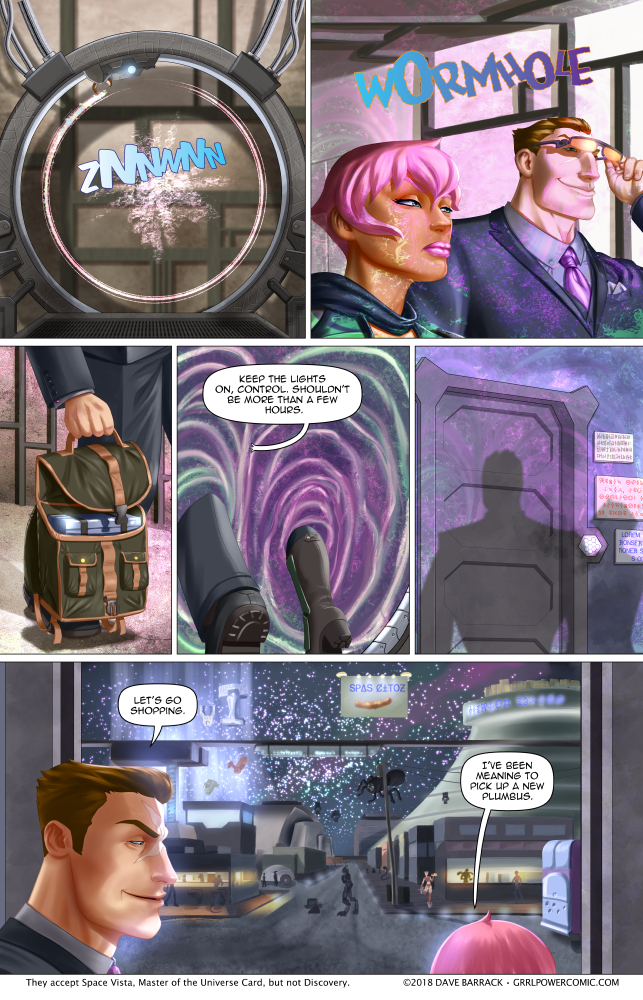Grrl Power #679 – Spree!
I’ve been trying to figure out what someone from a relatively low tech civilization could offer as currency to a higher tech one. I’m sure whole papers (or at least blog posts) have been written about this topic, but there’s only a few things I can think of, and some are dependent on the tech disparity.
If the high tech civilization has not just 3D printers, but something like matter replicators where you can build crap from the molecule up, the only things of real value I can think of would be information, power, labor and entertainment. The only physical material that would have intrinsic value would be things the replicators can’t recreate, like matter with a half-life shorter than, I don’t know, 40 years or something, like plutonium 241. Or maybe energon chips or zero point modules. Then that stuff would have potential value. Not that you’d want a bunch of loose change in your pocket made out of Californium 252. It would be asinine to use as currency.
If a civ does have matter replicators, information would still be valuable, like the plans to print your own Nintendo Switch, or the high tech civilization equivalent. In fact, if you had a civ with matter replicators and unlimited power, information like that would be nearly the only thing of value, I think.
If an advanced civ didn’t have matter replicators, then just about anything could be barterable. Gold has no intrinsic value. It’s a great conductor of heat and electricity and is nearly chemically inert, so it definitely has its uses. Humans generally go bonkers for it, but there’s every chance that an alien civilization could value some random material like aluminum simply because their planet has less of it, or because the aluminum cartel has told everyone that aluminum is desirable, the same way diamonds are here on Earth. Again, diamonds are useful in tools and other applications, but have no intrinsic value other than that we’ve decided as a race that they’re valuable.
Power is obvious. Any civilization would need power, (and let’s assume that the laws of thermodynamics hold true no matter your tech level) unless they’re at a point where they know how to generate so much that it’s moot. Dyson sphere level civilizations would have to be pretty embarrassed with themselves if they needed more power than 100% of a sun. Or… 99%, depending on the efficiency of their solar panels.
Then there’s labor. If your civilization has matter replicators, they probably have robot labor. I mean, we’re getting to that point. We have machines building cars, and in a few years those cars will be driving themselves. Amazon’s warehouses are full of industrial roomba things that carry stuff to and from shelves. Eventually all uber drivers and DoorDash drivers and UPS drivers will be replaced with robots, and we don’t even have matter replicators. But, if a civ has had a robot uprising like in Dune and their robots are no more advanced than roombas, then labor is something a low tech civ can trade on.
The only other thing of value a lower tech civilization can offer is entertainment. I drew Deus picking up a pack full of bars of something. I was thinking rhodium when I drew it, but honestly, let’s pretend those are fancy boxes full of thumb drives with terrabytes of human on human porn. Maybe some Hollywood movies and Buffy and Cheers and The Bob Newhart Show too.
Double res version will be posted over at Patreon. $1 and up, but feel free to contribute as much as you like.
















An interesting thought I often see in worlds that have access to Matter Compiler tech is the value of craftsmanship. Anyone can get a MC Suit with perfect lines and tailored fit, but only the truly wealthy can afford a handmade Armani, even if the quality isn’t as perfect. That does come back to entertainment to though, as a suit could be thought of as a performance piece you wear.
Very true. This was shown in Star trek DS-9. After all, everyone has access to replicated food. But Joseph Sisko still ran a thriving restaurant.
Yep, and a few individuals from various Star Trek series said that replicated food or drink just isn’t that good compared to ‘the real thing’.
There are a few episodes where they say that replicators aren’t perfect. They seem to work like fancy printers: able to create anything in existence as long as the ink cartridge didn’t dry out. There are a lot of molecules out there, so they’re almost always out of something. As a result, any replicated food will usually have a few creative substitutions in it (e.g. apples with glucose instead of fructose).
Or, it could just be lazy writers who really wanted an excuse to throw in a restaurant scene.
Fact is, you run across that with ‘made-by-hand’ foods, even if using fresh authentic ingredients
The thing with replicated foods and drinks, is that there is no variation: every single dish is exact because it is a copy of the original, which is great if you like your Earl Grey a specific way, not so great if you are serving the same risotto to a large group of diners for a week
I live in a pretty foodie-rich environment, lots of restaurants from all over the world. A lot of them are very good quality at affordable prices, some of them run by genuine chefs in quality and presentation…and then there’s this one 24/hr mexican restaurant. The food is good, don’t get me wrong, but I finally figured out -what- it tastes like. And when I told my ex-chef roommate (retired due to health problems) what it tasted like (he doesn’t like the place), he blinked and realized, yeah…that IS what the food there tastes like.
It tastes like it’s made by real people. Not like it was made by chefs, but by real people.
That makes it authentic purchaseable home-cooking, in my books. ‘Cause sometimes you just want some frikkin’ home-cooking-tasting food, the kind made by real people, not chefs, ya know?
At a certain point in my youth, I made jewelry. Not, I hasten to add, bead stringing or similar handicrafts, I worked mostly in silver using a torch with various stones set in what I was doing and using graduated grit on cloth or rubber wheels to get a fine finish, and then polish with zam or cerium oxide or jewelers rouge.
I discovered, quite early on in this endeavour, that people don’t want perfect when they get handmade. They want to see something that looks “crafted”. I quit stressing over tiny imperfections when I realized that.
Similarly, if it tastes “home made” it’s probably not perfect.
(Yay for artists & artistry!)
I think that’s why that particular restaurant’s food, while not the freshest ingredients prepared in the absolutely most tantalizingly appetizing way, was acceptable. A bit of a tautology, but…because it’s not perfect, the imperfections makes it real.
An excellent point. I would go a little further in saying beauty is found in imperfections. Perfection is lifeless and bland. Machines can achieve great precision, but the products fall short of beauty. This is the essence of handcrafted vs machine made (or replicated in sci-fi). The Japanese term wabi-sabi encompasses this idea of perfection with a little natural randomness. With food, whether from variations in ratio of ingredients, temperature, and preparation techniques allow an uniqueness to each experience and maybe to each bite.
This is the quote I had in mind (Francis Bacon) “There is no excellent beauty that hath not some strangeness in the proportion”
Whatever happened to cooking with real butter and the fats you got from bacon etc.
We used to keep the fats from cooking bacon and similar fatty foods and occasionally re-render it for cooking with.
Used to? When I was a kid my parents had a tin container of about a cup in size. It had a lid, and under that a removable tin insert that served as a filter, being riddled with tiny holes. Cooking oils would be poured into this for later use in cooking.
Now as an adult I keep a similar container on my own stove. I only add to it things like fats rendered from bacon or suet. But it lasts just fine on the stove for about a month, at which point I’ll discard it and start anew.
Artificial scarcity like that has long been around among humans already too.
Why would a civilization with a Dyson Sphere be embarrassed about needing more energy? That just means they’re either numerous enough that just one doesn’t cut it, or using it all for something.
As for what to trade, assuming there are NOT matter replicators, even certain basic chemical compounds might be valuable on an alien world, like caffeine or adrenaline (both of which might be extremely poisonous and dangerous to manufacture even, then humans are like – ‘ oh yeah we drink that to wake ourselves up’ or ‘oh we have that in us naturally to make us do stuff better’)
Or maybe there ARE matter replicators, but they don’t work like Star Trek. They can only make elements and compounds, but can’t make the actual inventions.
Or maybe there are matter replicators and they DO work like Star Trek, but human entertainment is uniquely valuable – like in the Orville how they used Reality Television in order to trade to that intergalactic zoo.
Good god I hope Deus isn’t carrying every episode of every reality TV show ever made – space doesn’t need Keeping up with the Kardashians, The Real Housewives of Orange County, John and Kate Make Eight, The Osbournes, Flavor of Love, and The Simple Life, to name a few.
Yeah, a basic molecular assembler would/could produce massive sheets of a specified material, but leaving it up to craftsmen, robots, and what not to make use of that material. Simplifying the workload by simplifying one machine to a basic task to hand the material down the line to be specialized.
But as I’ve always said, entertainment tech and forms of entertainment require so many x-variables that it is bound to be dramatically different between species (even more so than between cultures) to the point one can enjoy the others’ but never have come up with it themselves.
I’m betting he’s got every lost episode of Doctor Who in that backpack.
So, wich Incubus did he steal that from?
My guess: His father was wealthy enough when the series first came out that he owned a television station and made copies for himself and young Deus to rewatch over and over. Deus has been hording them for just such an opportunity.
I thought it would be the other way around. He is looking for an someone that picked up the original broadcasts and saved them.
A Complete Dr Who (1-14?) in HD/3D would be worth a pretty penny back here on Earth. Just be sure to do some post-processing to make all those tarps look a bit nicer.
Well then obviously Deus can’t have that, since he clearly isnt the type to have expensive things.
Except for everything he owns :).
“Mmm, what can I use as currency? I know a bunch of apocalyptic devices. I’m sure even advanced civilizations can be entertained by new and interesting ways to destroy worlds!”
Proffessor Farnsworth???
yeah he does seem to specialize and doomsday devices.
“I suppose I could get rid of one of them and still be feared…”
“Xena, Warrior Princess” in digital format is valuable at galactic truck stops, although the translation to 3d and Galactic Language was named “Gabrielle, Warrior Queen” because (spoilers) when you binge the entire program it becomes obvious that the entire show was just about Gabrielle finally becoming a girl with a chakrum and having a ghostly advisor. Luckily, the Ancients put a percentage of the profits in an escrow account along with the residuals on Jerry Lewis movies and The Three Stooges. You just have to find the Embassy and prove you are an Earth Human derivative.
There’s a lot to which elements are rare that is simply physics. Most elements have to be produced in supernovae (or as decay products from elements that were produced in supernovae), and some of them just aren’t produced very effectively there. Some elements that are relatively common (for heavy elements) are dense on their own and rarely form compounds with lighter elements, so in any planet large enough to differentiate (and it’s hard to imagine life forming on something smaller than that) they end up inaccessible in the core. There’s random variation too, of course, but you’ll rarely find a rocky world with more gold than aluminum in its crust since aluminum is light and readily forms an oxide (among other compounds) whereas gold is heavy and not very reactive.
Also, I don’t think you’re using the phrase “intrinsic value” properly. Gold and diamonds do have intrinsic value due to their useful material properties, even if their market value is primarily extrinsic, driven by their rarity (whether natural or artificially restricted).
There’s no intrinsic value to swapping pieces of paper around. The reason we do is because, even though we have the ability (and have for a while now) to live in a moneyless society, people are greedy. It’s just as much about what others don’t have as much as it is about what one has. Imagine living in a post-scarcity society in which you just print yourself out a new hovercar because your old one isn’t working anymore. Your annoying neighbor prints out two the next day, and you’re sure it’s just so he can feel like he’s superior to you somehow. Easy to see, isn’t it?
It’d be the same way on alien worlds. The quantoos or popolons or whatever they trade may not have any intrinsic value, but it’s a way for the wealthy to still be able to say “I’m wealthy,” which seems to be way too important to way too many societies.
It’s not just greed, it’s because people don’t like to work if they can avoid it and our society still requires human labor to function (whether in the form of manual, mental, or creative efforts). There are alternative ways of encouraging people to do stuff that benefits others but most of them rely upon either small groups of people who all know each other personally (so everyone knows not to give their stuff to Lazy Dave) or punishment instead of money. Maybe a high-tech society can use online social ratings like that Black Mirror episode in place of cash. But the principle remains the same.
Maybe a species that was more genetically hardwired toward diligence and altruism than humans could function without any kind of reward for their efforts, or a species that was served by robots that were programmed to enjoy diligence and servitude (although in the latter case you might still have people trying to one-up each other in the way you said).
I have a question about the room they entered, if they are sneaking there or if this is more like a dialed up VIP lounge for personal wormhole travel.
Aside I am seeing two outcomes for the sake of comedy.
1: Deus makes the comment that no one from Archon will ever know they were here; cue Sydney flying past them.
2: Deus is taken to a new arrivals’ lounge for potential new customers; but because he arrived in a generic personal wormhole and has low tech currency; he is passed up by yes-men for the Fracture waiting on the individual who arrived in the much more high tech Aetherium Causeway, and has entertainment currency in the forms of arts and crafts including a material their replicators haven’t scanned yet; felt; and they are willing to trade a great deal for first access to the new material that feels so good on their touch receptors.
The door implies an airlock/teleportal.
Wormhole arrivees are directed there automaticly.
Without looking at anyone else’s posts (to see if someone else thought of it), what I see happening is that Syd sees Deus and Vale exiting a door. She lands and goes through it and through the wormhole. On the other side, she sees the brane ripper and exclaims, “Hey! our side wanted this!” and removes it from the En-Stargater-machine. She then flies back to headquarters, where much rejoicing ensues.
Maybe Deus and Vale can hitch a ride back with Dabblers friends. Or maybe Vale, Deus, and all the Alari souls that Vale consumed are now out of the story for a year or six.
am I the only one who noticed that their shopping trip is taking them to a planet that looks suspiciously like the one Sydney is on right now?
Nope! Same street view from last Monday. Just different aliens wandering around.
But personally from conservation of detail, I figured it would be the same location anyway.
Looking at it I think it might be the exact opposite end of the street showing in 677.
The view is rotated 90º.
Deus and Vale are exiting the cylindrical structure on the right
in image #677.
even with matter replicators many interpretations need feedstock so one could trade rare and useful elements
One thing an advanced civilization needs is base elements. Battery technology in the Real World is dependent on certain rare-earth elements that have “rare” in the name for a reason.
Then there are collectors for whom a replicated version of a thing isn’t good enough. They want the original.
If you are crossing dimensional barriers Earth may have things that are literally impossible to do locally.
Actually rare-earth are NOT rare, they’ve been named so because in the XIXc chemists had trouble isolating them from their ore. That’s all.
https://pubs.usgs.gov/fs/2002/fs087-02/
They are rare enough that China has placed them on a limited export list, which harms a lot of industries that would like to have access to them in greater quantities. It probably also jacks up the price by a significant amount.
I think any Civ past a point would hav enough to make like avatar clones, and that way sell expriance.
Life form or Genetic makeup might be proteced by galacit law taht no outside of the race my trade in that form of expriance.
But the problem with some of the entertainment how alien it might seem (just think Telenovala and easten tv.) you also got Inside jokes (running gags), social norms and as well as diffent sensory functions. Like if they watch light at diffent spectums, or hear a higher range of sounds.
So my conculsion is at those pennical of civlation you’d be selling the human expriance, and not just a set of dvds, But try being human for X amount of time. but that did fall under the catagory of Infomation/entertainment.
Most of the comments on this comic are presuming a civilization that can make any product out of base atoms or out of energy is still capitalist. This seems unlikely to me.
For all of human history, scarcity has forced us to barter my X for your Y and this is simpler with a currency as a go-between. However a post-scarcity society would look very different. Why would you need to exchange a currency if both people involved can just print out their own X and Y? Depending on the society this might cost them a pile of literal garbage with the mass of each, (mass -> energy -> mass of new product.) Or it might cost them nothing at all, (the dyson sphere they live in produces so much power that everyone in the society has more than they need.) In a society where the cost to produce any item is trivial, the whole concept of trade and barter breaks down.
Star Trek tries to show this by saying the federation doesn’t have money and people do their jobs because they enjoy them, not for monetary compensation. However the writers couldn’t really envision how that would work, (and they wanted a greed-based race) so they eventually gave up and made gold-pressed-latinum. This was more a failure of the writers imagination than a likely outcome with a replicator-level society though.
I’ve always thought this is just another form of the error of thinking that leads to arguments about what money is “backed” by. Which admittedly is one a lot of people make, and one with quite a venerable science fiction history. I believe the first replicator stories are George O Smith’s Venus Equilateral ones from the 40s, and they’re very concerned about finding a replacement for gold.
But money need not have any intrinsic value at all (the electrons or magnetic polarities storing your bank accounts right now don’t), and trade is not really about things, but scarcities. As long as there is something scarce (and if people *have* jobs, then there necessarily is at least of whatever labor they are doing in them) then there is something to trade and hence some use for money.
While money doesn’t need to be backed by anything, (it really isn’t right now) The need for money requires scarcity. We could move to a post-scarcity society with pretty close to current technology, (most of the scarcity in the current world is artificial, caused by a small percentage of people taking WAY more than they need.) Unfortunately the current social structures would oppose that and you’d need something massive to change that, (replicators I think would be a massive enough push.)
Chocolate. Deus has a backpack full of chocolate bars.
Which happens to be extremely toxic to most alien species, and thus useful as a chemical weapon.
Other substances from Earth surprisingly toxic to most alien races.
1: Milk
2: Latex
3: Caffeine
4: Potatoes
5: Tobacco
all or some of which have been added to, covered by, combined with, or made better by chocolate
and I believe it was Mayans or Aztecs that smoked chocolate
They’re surprisingly toxic here on earth as well:
1. Lactose intolerance, specifically in those of Asian descent.
2. I know people who had to quit their careers due to latex allergy (can’t work in a lab if you can’t wear the required protection…)
3. “Weekend withdrawal” gives quite a few people headaches, and don’t get me started on teenagers overdosing on energy drinks
4. Solanine! Don’t eat the green parts!
5. Just look up any statistic on lung cancer, the specific kind of DNA damage it does is even detectable as a “mutational signature” in the tumours it spawns.
and we have a winner, (honestly didn’t think anyone to catch on to this LoL).
every option while common to western civilization is actually toxic in one for or another to most other life here on Earth, I was going to use apple or peach instead of potato but thought they’d be too obvious.
If you haven’t read it already, I highly recommend a book called Diamond Age, by Neal Stephenson ( https://en.wikipedia.org/wiki/The_Diamond_Age ) It covers a lot of the topics mentioned re: matter manipulation and the value of energy and information in that kind of society. They call it the Diamond Age because with the ability to just rearrange carbon however you want, why not make things out of diamonds?
“Value” is a measure of scarcity. A sufficiently advanced civilization would be “post-scarcity” economics, where value is based more on what the individual values it as. Money, or rare metal value (gold standard/silver standard) are not in any way as we in our capitalist myopia see it at that stage.
What value gold when you can make it? What value labor when a robot can make it nearly free? What value diamonds when a gas giant may have a diamond larger than the Moon at its core? Art is in the eye, and mind, of the beholder. Transuranics are of limited value or use due to the unstable nature and potential health hazards.
Capitalism does not make sense when materials and labor are devalued due to a lack of scarcity. We are in some regards seeing the beginnings of that in our society. “Things” are getting functionally cheaper while labor is getting more and more often replaced with automation. (How many realize that “self check” aisles at the grocery store are costing jobs by replacing several people with a machine?) Robots are making our cars, our Q-Tips, our pens, our watches etc etc etc. We have no need of gold or silver directly in our private lives so while the “value” of gold or silver as investment metals is rising, the NEED for them is almost totally absent. Wealth now is measured in a functionally theoretical measure of value of investments no longer attached to attaining security. Wealth for the sake of wealth has become the goal of the wealthy, like a score card. The system we have now is becoming rapidly untenable as our investment value attached to a thing is rising, while its intrinsic value is falling, and while LABOR value is falling. This is a recipe for poverty and a societal crash. If we don’t find an answer to the wealth disparity this causes, our chances of becoming one of these theoretical “advanced societies” diminishes.
True value come from demand.
It doesn’t matter if the supply is high or low if there is no demand.
That’s why art and creativity will be in high demand in a post-scarcity world. When our basic needs are met, humans relax and become more creative, innovating and designing and tweaking in leisure. Also, we get bored easily when we have nothing to do, and start designing things. (Rube Goldberg devices are a direct corollary to these two factors; they are art and creativity, design, and innovation.) Music flourishes, drawings become more realistic, technology leaps forward…
The Renaissance happened as a fallout from the labor shortage/scarcity following the Black Death; fewer workers meant they could demand higher wages and garner more luxuries. It also at the same time forced the fewer workers to start getting serious about innovating ways to create force multipliers to do with fewer people the same or close to the same amount of work that used to require many–water-powered and wind-powered mills for grinding grain began to be used for fulling cloth*, and for operating bellows in blast furnaces smelting iron ore into iron ingots, on and on.
For those who aren’t naturally creative, consuming art (whatever the form of entertainment) becomes the demand, and the creators the suppliers…but you can only create up to a point based on what you yourself know, understand, have experienced, etc. Your culture, your surroundings, the focus of your training will heavily shape what art you produce. Cross-pollinating ideas from other regions, cultures, belief systems, and resources available often reinvigorates creator-energies and flagging creator-interests.
Art is fairly loosely defined, but basically it’s something that stimulates the viewer’s perceptions. It can be an inspiration found in many different ways, some of them bizarre to humans–like stuffing and mounting frozen popsicles like you’d stuff and mount a trophy fish–or in familiar ways: the very concept of creating art out of food (designs carved in pumpkins and watermelons) could be absolutely mindboggling to some cultures, an idea they’ve never thought of doing themselves before…and while there may be imitators rushing to jump on this new artform…it will always take a while before the newcomers are anywhere near the skill of the original creators’ abilities and mastery.
(*Fulling cloth went from hand-beating the fabric over the course of a couple of days with lightweight mallets to mechanically lifted and dropped big heavy hammers that could beat the cloth to produce the same effect in just a few hours, all to force the weave to shrink down and close up the gaps in the loosely woven fabric, making it tighter and more wind-resistant, etc. Modern cloth doesn’t usually go through this fulling process anymore…which is why when you go buy lengths of fabric at Jo-Ann’s or whatever, many staff members will remind you to wash & dry the fabric twice before cutting and sewing it, so that it doesn’t shrink anymore. Which is also why you buy extra lengths of natural fiber fabrics, to account for post-wash shrinkage, because the washing machine does a version of fulling the fabric for you.)
Able and legal are different things. Replicators can be prigrammed not to make restricted substances. A Dolph movie called I Come In Peace involved black market human endorphines, and Futurama had “human horn.” Dilithium and Latinum in Trek have structures too complex to replicate. Also, magic is likely not something that can be replicated. Or fully live creatures. Maybe those are filled with Pokeballs.
Is…that a Spacecataz reference? Man, that is a deep cut. Kudos.
Given that Earth is a popular, although unsuspecting, tourist destination; I’d say that Deus has something that the Xenoarchy prohibits removing from Earth. Illegality makes for scarcity, and scarcity makes people believe there is value in the illegal item. My guess is Pokemon cards.
Well, Sydney now has someone who might take her paper money for taxi fees? I bet Zeus’d even process her credit card for the remainder.
The only thing really unique to earth is our ecosystem; 4 billion years of diverse genetic material that you will find nowhere else in the universe. Even for alien life, all those weird enzymes and strange carbon based proteins would be priceless. We sure as hell don’t value it enough. Wipe out enough of your own genetic diversity and you may end up searching the universe for compatible material. And it’s almost impossible to write new DNA sequences from scratch. If you want to terraform a planet, stop aging, or cure cancer you have to have as wide a toolkit of genes as possible.
A Plumbus eh? But does she know how those are made?
As for the whole “What to trade” stuff, Star Trek had 3 workarounds:
– some materials could not be replicated. Dilithium Crystalls and Latinium in particular come to mind
– living and livingcapable mater. No replication of puppies. Proper Gagh. Replacement organs (except Worfs spine that one time). Bioneural gelpacks for the Voyager.
– Quality. As someone else said, really cooked food could taste better. And that is before you consider that some species valued only living food real food (Gagh, Toothgrubs).
Plumbus just seems like a more elaborate rip-off of Super Happy Fun Ball.
As long as they aren’t thumb drives with the Kardashians on them or it would be a race to see which alien can glass us from orbit the quickest if they think “that” is the highest form of entertainment we as a species have to offer.
You should check out the “XenoTech” series (it’s entertaining Sci-Fi), but in it, other planets enjoy watching our ridiculous reality channels like C-Span or anything that relays our governmental meetings… Because our government…
Just saying, it doesn’t all have to be porn. :)
This stretches coincidence a bit too far. Especially if Deus and Vale actually run into Sydney on this massive object.
I thought this for a bit too, but this DOES seem to be a central travel hub. Cora’s crew knew it by name rather than by catalog number, so it’s a pretty well-known spot.
As a metaphor, suppose there are as many habitable/inhabited worlds in the universe as there are pages on the internet. What are the odds that two particular people would be visiting the same world/page at the same time?
Deus: “Hmm. Time to google something.”
Sydney: “Hey, this rainbow G looks interesting. It’s one of only five preinstalled bookmarks so it’s got to be important…”
The bigger the universe (and internet) is, the MORE this will happen.
(And the TIMING isn’t mere coincidence either. The same Macguffin that stranded Sydney on an alien world and forced her to grind for FTL capability was made available for salvage by those same events, which is how Deus got here.)
You would think the aliens would control incoming/outgoing gates. Does the magic artifact by pass that or did Deus actually get connection approval? Does magic use a completely separate gate system than tech gates?
I’ve looked through the previous messages and there is nothing that relates “plumbus” to Latin, where the word “plumb-bum” referred to “lead” (and is why the chemical symbol for lead is “Pb”). A plumbus might be nothing more than a lead sinker (or equivalent plumb-bob used in the construction industry) –I would not put that past DaveB’s sense of humor for the comic.
A plumbus is this thing they showed one or twice on Rick and Morty. Check out YouTube for a clip.
Did you try google?
https://cdn.instructables.com/FPX/521W/J6QQFI4V/FPX521WJ6QQFI4V.LARGE.jpg
and for Christmas
https://images-na.ssl-images-amazon.com/images/I/91omzVlvIHL._UX385_.jpg
Some people called this strips ago. i was not one of them but i did think it was possible. i wonder what Deus and Vale will say she they run into the mighty halo
*doesn’t read anything yet*
So that’s how Sydney gets home.
If you have matter replicators, maybe any high-density raw material is still valuable.
I mean, the energy/matter conversion ratio is pretty steep… steep enough that the most effective way to produce energy is probably to just kick your replicator into reverse and chuck stuff into it.
Matter/Anti-Matter is only more efficient if both are easy to come by, and you capture at least 51% of the released energy…plus whatever the reaction/storage/etc costs you.
Dyson spheres put both to shame, of course (cause you don’t have to produce any energy, just collect it, so any level of efficiency is ultimately amazing), but you can’t exactly cart one of those around with you on your spaceship.
The chances of two people randomly appearing on the inner surface of a Dyson sphere and meeting each other has got to be close to zero. Unless it involves Sydney. Sydney has a habit of seeing things that nobody would expect her to see. I suspect she’ll spot Deus and Vale first, and follow them, and not introduce herself. Just because she’ll be super suspicious.
“Just because she’ll be super suspicious.” Then she will use her true-sight to examine them, to see if they are real.
The she will see what Vale truly looks like, what will she see?
I’ve personally always thought that in this kind of scenario that Earth’s biggest initial export would be music. From classical to modern we have a lot of sounds that are likely completely unique to our civilization and which wouldn’t have any filtering aspects by species or culture compared to exporting myths and stories or film. By extrention, securing intellectual property rights for our planet would be very important.
Different base elements may always be relatively valuable, gold, silver, copper, platinum, rare earths etc. will always necessary in a technology manufacturing society. Diamonds, emeralds and other crystalline forms of matter…nah. We already manufacture perfectly flawless diamonds in just about as large as your want which are far less valuable than natural diamonds with flaws. Same thing with just about any other gemstone including star sapphire. Energy in a safe, transportable form will also be valuable. It takes a tremendous amount of energy to transform one element to another such as the classic lead to gold. If the technology exists to actually create matter from energy, that is an entirely different, orders of magnitude type stuff that calls for a LOT of energy. Consider the energy released by a nuclear weapon. Now, think about taking that amount of energy and converting it back into plutonium.
In many fictional universes, including this one, some alien species have what would be superpowers to a human, just by virtue of their species. But do humans have capabilities that would be superpowers to the rest of the galaxy? Something mundane to us, but possibly unique and valuable to others? It’s kind of like the question about earth’s tradable resources, but in labor terms. Non-humans we’ve seen so far seem pretty much human++, but maybe that’s a biased sample.
“Ben 10” is an obvious one. Though humans ability is to be genetically compatible with many of them.
In the DC universe this is the entire premise behind the Legion of Super-Heroes.
Somealienguy: How can you detect trace amounts of clorine in the air?
Somehumanguy: I can smell it.
Somealienguy: Smell?
Man, I could really use a plumbus myself. :<
but what does it DO?
I was thinking that I would bring music and books along with movies. Maybe I could even find out what happened to Elvis.
I’d love to see Deus utterly flummoxed and nonplussed.
Deus has a conundrum ahead of him (not that he knows it), save Sydney and earn favour from Archon to use in nefarious plans/plays later but alert Archon to his portal tech, or ensure her death at the risk of it possibly being discovered (as Harem can warn him that Archon has off world contacts on her trail).
To date Deus has only been seen to kill one person and they were definitely a bad guy, he might not actually have it in him to say no to Sydney plus he may end up working as her financial advisor if she can get some reward money for informing someone about the squids.
Plus no way can he withstand the puppy dog eyes.
I wish matter replicators did not exist in fiction. The inherent problem I see is, why work? Why should you do anything? At some point, automation will do so much of the work there would be mass unemployment and no jobs=no money, no money=no one to buy stuff (economy),
no economy=no government (Why should I obey those blow hards? What can they do to us at this point? We have a replicator and the magical muguffin power source.)
No government=The end of Civilization. Which will probably reset technology, as it always seems to. (looking at you Rome)
Only if we continue to allow the selfish, self-centered, and greedy to control everything. Instead of hoarding unimaginably vast amounts of wealth in bank accounts, if our oligarch billionaire greedy buttheads out there instead used that money to provide free housing, healthcare, and food for all, plus a little extra for sundries (clothing, soap, internet–basically, basic income, yay!), some people would leap straight into creating and innovating out of pure love of it (or boredom), and others would be free to enjoy the fruits of their labors without the may-it-die-a-billion-deaths “starving artist” trope literally causing artists to starve and cease creating because they’re trapped in poverty by the greed-diseased people in power.
Remember, right now people hate having to work…but there have been polls and studies done that have proven that it’s the insufficient wages (and butthead managers) that make most people unhappy about their work. If they could literally afford to live and support a family, most people would happily do their current jobs. (Having a nice, supportive, good manager/immediate superior/boss also means they’d be happier doing their current line of work, according to various studies.)
The money is there to pay everyone enough that we could all live with secure housing, adequate food, clothing, even extra money for entertainment. It is there…being sucked up into the bank accounts of millionaires and billionaires afflicted with Hoarding Syndrome (what they hoard being money). (Or, y’know, they’re sadistic bastiches who get off on the suffering of others.)
…That’s something I like about Deus. He actually does give value back to the communities he’s exploiting. The current economic setup means he cannot afford to insta-give people in a third world country a first world downtown NYC lifestyle, that he instead has to bring them up through successive stages of improvement, reserving a certain percentage of profits for sinking back into further improvements…but he is improving the lives of those living & working in his bought country…which is more than most “good guys” do, never mind most potential villains (or at least ambiguous antagonists).
(And I really do think he has the superpower of “acquiring hidden, inconvenient-for-others-to-know information”…)